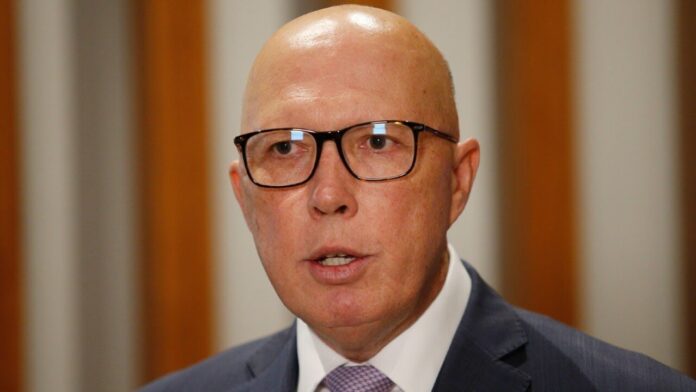Experts argue that nuclear energy is the most expensive form of bulk electricity, making Dutton’s claims of cheaper power bills under his plan implausible
Peter Dutton’s assertion that nuclear energy would lead to lower power bills has been met with scepticism by energy experts. Tony Wood of the Grattan Institute and Dr Dylan McConnell, an energy systems researcher at the University of New South Wales, both refuted Dutton’s claim. They cited a recent CSIRO analysis indicating that nuclear power is more expensive than other energy options. Instead, they pointed out that the ongoing construction of solar and wind systems, supported by firming technology, remains the cheapest energy solution.
Dutton, the opposition leader, announced the proposed sites for seven nuclear power plants, to be built in Australia and owned by the Commonwealth under the Coalition. However, he did not provide cost estimates, a strategy for lifting existing federal and state bans on nuclear power, or a realistic timeline for the plant’s completion. The Coalition’s plan anticipates the first two plants to be online by 2035 or 2037, a timeframe experts deem overly optimistic.
Chris Bowen, the climate change and energy minister, labelled the Coalition’s nuclear plan as a “risky scam” and reiterated the Albanese government’s commitment to achieving 82% of power generation from renewable sources by 2030.
Dr. McConnell dismissed the notion that nuclear energy could reduce electricity prices, emphasizing that nuclear power is the most expensive bulk electricity source. He also criticized the Coalition’s support for new gas-fired power as a transitional solution until nuclear plants are operational, arguing that gas is a costly option that would further drive up electricity prices.
Tony Wood echoed this sentiment, noting that the Coalition had failed to substantiate claims that nuclear energy would be cheaper. He attributed recent electricity price hikes to global factors like Russia’s invasion of Ukraine, which drove up fossil fuel prices, rather than Labor’s renewable energy policies.
McConnell added that comparisons to lower nuclear power costs in other countries, such as Canada and France, are misleading. These countries have long-established nuclear industries, whereas Australia would face higher initial costs. He also questioned the feasibility of constructing nuclear plants in Australia before 2040, given the unproven commercial viability of small modular nuclear reactors, which the Coalition plans to deploy in South Australia and Western Australia by 2035.
The Coalition’s proposed nuclear plants would be located at sites of existing or former coal-fired plants, including Tarong and Callide in Queensland, Mount Piper and Liddell in New South Wales, Collie in Western Australia, Loy Yang in Victoria, and near Port Augusta in South Australia.
Barry Traill, director of the advocacy group Solutions for Climate Australia, criticized the Coalition’s proposal as a “fantasy” that would result in at least 2.3 billion tonnes of carbon dioxide emissions over the coming decades due to increased fossil fuel use. Traill stressed the urgency of immediate action, highlighting that significant progress is needed this decade to combat climate change.
Analysis
Political: Peter Dutton’s nuclear energy proposal reflects the Coalition’s strategic pivot from renewable energy towards traditional energy sources. This move is politically motivated, aiming to position the Coalition as proponents of stable and reliable energy, countering the Labor government’s renewable energy policies. However, the lack of concrete details and realistic timelines could undermine the Coalition’s credibility on energy policy.
Social: The debate over nuclear energy versus renewables is a microcosm of broader societal discussions on sustainability and future energy security. Dutton’s plan could polarize public opinion, particularly in communities near the proposed plant sites. While some may support the job creation potential, others may resist due to environmental and safety concerns.
Racial: Indigenous communities in Australia, who often reside near resource-rich lands, might face significant impacts from new nuclear projects. Historically, these communities have been marginalized in discussions about land use. Ensuring their inclusion and addressing their concerns will be crucial in any future energy projects.
Gender: Energy policies and their implementation can have differential impacts on men and women. The job opportunities created by nuclear plants may predominantly benefit men unless there are targeted efforts to include women in the workforce. Furthermore, energy affordability and reliability directly affect households, where women often bear the brunt of economic hardships.
Economical: The economic implications of shifting to nuclear energy are profound. Initial costs for nuclear infrastructure are high, and the financial burden may fall on taxpayers. In contrast, continuing investments in renewable energy could provide more immediate economic benefits, such as job creation in the renewable sector and lower long-term energy costs. The proposed nuclear plan may lead to higher electricity prices, affecting both households and industries.
